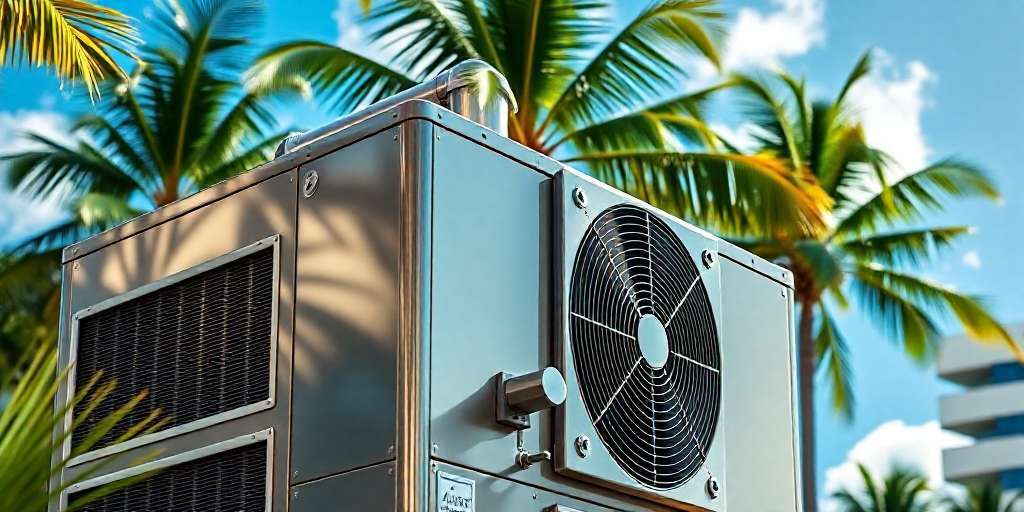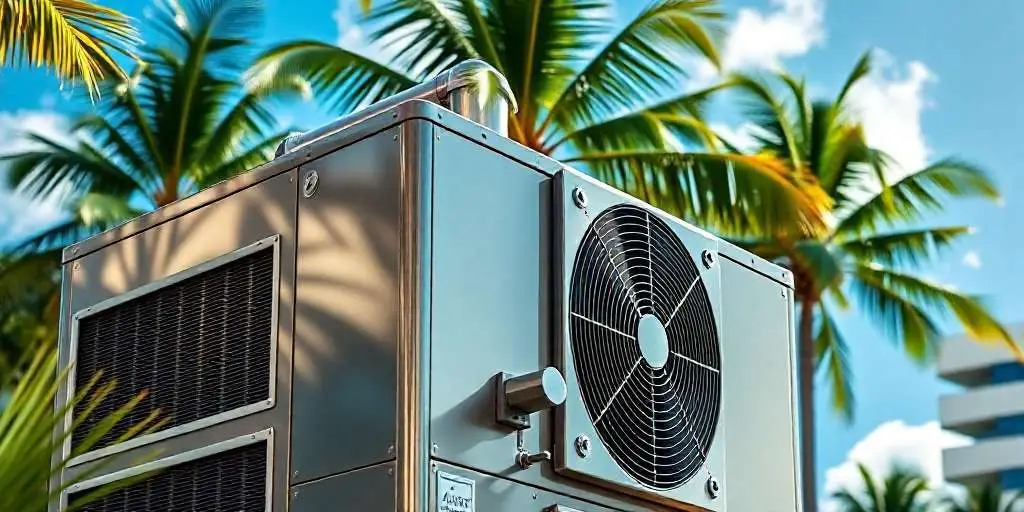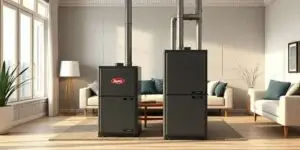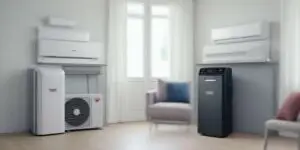AC Repair Miami: Essential Tips for Keeping Your AC Running Smoothly. Air conditioning is essential for comfort in Miami’s hot climate. Knowing when to seek AC repair is important for maintaining indoor air quality and preventing heat-related health issues. This article covers the signs indicating AC needs repair, regular maintenance tips, and how to choose the right service provider. It also explores available services and sustainable AC solutions suited for Miami’s unique environment.

Importance of Air Conditioning in Miami
The presence of effective air conditioning systems is crucial for the well-being of Miami residents. With the city’s tropical climate, understanding the necessity and benefits of air conditioning is essential.
Climate and Temperature Challenges
Miami experiences a tropical monsoon climate, characterized by high temperatures and humidity levels that can reach uncomfortable extremes. During summer months, temperatures frequently exceed 90°F (32°C), making air conditioning a vital component for maintaining indoor comfort.
Additionally, temperature fluctuations can lead to increased stress on HVAC systems. It is important for residents to have reliable AC units that can handle the intense heat and humidity.
Health and Comfort Benefits
Beyond comfort, air conditioning plays a significant role in maintaining health, especially during the sweltering months in Miami. A properly functioning AC system provides numerous health benefits.
Impact on Indoor Air Quality
Air conditioning systems help filter and regulate indoor air quality by removing pollutants, dust, and allergens. They also manage humidity levels, reducing the likelihood of mold and mildew growth, which can negatively affect respiratory health.
By circulating cool air and expelling stale air, AC units create a more pleasant indoor environment conducive to better health and productivity.
Preventing Heat-Related Issues
The dangers of heat-related illnesses cannot be underestimated in a city where temperatures soar. Air conditioning helps combat heat stress, heat exhaustion, and heat stroke, especially for vulnerable populations such as the elderly and those with pre-existing medical conditions.
Maintaining a cool indoor environment is critical for preventing these serious health issues, particularly during heatwaves. Effective air conditioning systems become essential lifesavers during periods of extreme heat.
Signs Your AC Needs Repair
Recognizing the signs that an air conditioning unit requires repair is essential for maintaining comfort and efficiency. Various indicators may suggest that the system is not functioning as it should, necessitating professional attention.
Warm Air from Vents
When vents blow warm air instead of cool, it signals a problem. This could be caused by:
- Issues with the refrigerant level.
- Problems in the cooling coils or compressor.
- Clogged air filters obstructing airflow.
Excessive Humidity Levels
A properly functioning AC unit should lower indoor humidity. If a space feels humid, it might indicate:
- Insufficient dehumidification due to equipment failure.
- Blocked drainage systems leading to water accumulation.
Rising Energy Bills
A sudden increase in energy bills often points to an inefficient AC system. This can occur due to:
- Ageing equipment that struggles to cool.
- Malfunctioning components causing excessive energy use.
Unusual Noises
Uncommon sounds like banging, grinding, or hissing during operation can signify mechanical issues. Possible reasons include:
- Loose or damaged parts needing replacement.
- Debris obstructing moving components.
Leaks and Moisture
Puddles around the AC unit or water damage on ceilings and walls indicate serious issues. These may arise from:
- Failing condensate pumps.
- Improperly sealed ductwork causing condensation.
Inconsistent Cooling Across Rooms
If certain areas remain warmer than others, it may suggest problems with the air distribution system. Contributing factors include:
- Blocked air ducts.
- Imbalanced airflow due to restrictive furniture placement.
Regular Maintenance for Your AC
Regular maintenance of air conditioning systems is essential for their efficiency and longevity. Performing routine checks can prevent costly repairs and ensure a comfortable indoor environment.
Changing Air Filters
One of the simplest and most effective maintenance tasks is changing the air filters. Clogged filters reduce airflow and strain the system, leading to higher energy consumption and potential damage. It is recommended to check and replace the filters every one to three months, depending on usage and air quality.
Component Inspections
Regularly inspecting the various components of an AC system can help identify issues before they escalate. Key components that should receive attention include:
Compressor Check
The compressor is crucial for cooling, and its performance should be assessed during routine inspections. Signs of wear or failure can include unusual noises or inconsistent cooling. Regular checks can ensure the compressor operates efficiently.
Coil Cleaning
Both the evaporator and condenser coils can accumulate dirt and debris, which can hinder performance. Cleaning these coils helps maintain efficiency and prolongs the life of the system. Coils should be cleaned at least once a year.
Thermostat Calibration
Thermostat accuracy is vital for maintaining desired temperatures. Regular calibration ensures that the thermostat correctly communicates with the AC unit, preventing overworking the system and maintaining consistent comfort levels.
Refrigerant Level Check
Maintaining the proper refrigerant level is essential for an efficient cooling process. Low refrigerant levels can indicate leaks or other issues. Regular checks help ensure optimal performance and energy efficiency, preventing unexpected breakdowns.
Duct Cleaning and Sealing
Over time, ducts can accumulate dust, allergens, and debris that can affect air quality and system performance. Cleaning the ducts improves airflow and indoor air quality, while sealing any leaks ensures that cool air reaches every room effectively.
Choosing the Right AC Repair Service in Miami
Selecting a reliable AC repair service is crucial for maintaining comfort in Miami’s humid climate. Numerous companies offer a range of services, but choosing the right one requires careful consideration of several factors.
Reputation and Reviews
The reputation of an AC repair service is indicative of its reliability and quality of work. Potential customers should search for online reviews and testimonials from previous clients. A high number of positive ratings can signal a trustworthy service provider. Websites such as Google and Yelp often feature user-generated reviews that can help gauge a company’s reputation.
Experience and Expertise
In the HVAC industry, experience matters significantly. Companies that have been in business for several years are likely to have encountered a range of issues and have developed effective solutions. Furthermore, expertise in specific types of air conditioning units is essential, especially for complex systems like central air or ductless mini-splits.
Certifications and Licenses
Hiring a qualified technician ensures compliance with local regulations and standards. A reputable AC repair company should possess all necessary licenses and certifications. This not only provides peace of mind but also guarantees that the technicians are trained to perform repairs safely and efficiently.
Service Warranties
A service warranty is a strong indicator of a company’s confidence in its work. Reputable AC repair services typically offer warranties on their repairs, which protect customers against future issues arising from the same problem. Understanding warranty terms can help in making an informed decision about which company to choose.
Transparent Pricing
Clear and transparent pricing is crucial when selecting an AC repair service. Companies should provide detailed estimates before performing any work. This includes labor costs, parts, and any potential additional fees. Avoiding companies that present hidden costs can often lead to a more satisfactory experience.
Types of AC Services Available
Understanding the various types of AC services is essential for maintaining a comfortable indoor environment. Homeowners and business owners in Miami can choose from a wide range of options tailored to their specific needs.
AC Repair Services
AC repair services are crucial when units start showing signs of malfunction. These experts diagnose and fix issues such as:
- Warm air blowing from vents
- Strange noises during operation
- Unusual spikes in energy bills
- Leaks or excess moisture around the unit
New AC Installation
When air conditioning systems become outdated or inefficient, installing a new unit can be the best option. Professionals handle the entire process, ensuring optimal performance and energy efficiency. The following types of installations are available:
Residential Installations
Residential installations focus on integrating cooling systems suitable for single-family homes or apartments. These systems are designed to maximize comfort while minimizing energy consumption.
Commercial Installations
Commercial installations cater to businesses and larger buildings. These systems typically require a more complex setup, including centralized units designed to cool larger spaces effectively.
AC Unit Replacement
Replacing an old or malfunctioning AC unit may be necessary for improved efficiency and reliability. Experienced technicians assist in selecting an appropriate replacement that meets specific cooling requirements and budget constraints.
Emergency Repair Services
In the event of sudden air conditioning failure, emergency repair services are vital. These professionals are available to address urgent issues that can significantly impact comfort levels. Key steps include:
Steps to Take in an Emergency
- Turn off the AC system to prevent further damage.
- Check the thermostat settings to ensure they are correct.
- Inspect air filters and replace if clogged.
- Examine circuit breakers for any associated power issues.
Sustainable and Efficient AC Solutions
As the focus on energy conservation and environmental responsibility grows, sustainable and efficient air conditioning solutions have become increasingly important for residents in Miami.
Energy-Efficient AC Systems
Energy-efficient air conditioning systems utilize advanced technology to minimize energy consumption while maintaining optimal cooling performance. These systems are designed to use less electricity, which not only reduces utility bills but also lessens the overall carbon footprint of a household. Some of the key features include:
- High Seasonal Energy Efficiency Ratio (SEER): Systems with a higher SEER rating consume less energy and provide better efficiency compared to standard models.
- Variable Speed Compressors: These compressors adjust their speed based on cooling demand, leading to significant energy savings.
- Smart Thermostats: Integrated smart technology allows homeowners to optimize cooling schedules and monitor energy usage remotely.
Government Incentives
Government programs often provide incentives to encourage the installation of energy-efficient AC systems. These incentives can include:
- Tax Credits: Homeowners may qualify for tax credits when they upgrade to qualifying energy-efficient systems.
- Rebates: Certain local utility companies offer rebates for the purchase of high-efficiency air conditioning systems.
- Financing Options: Low-interest financing may be available to spread the upfront costs of energy-efficient installations over time.
Benefits of Upgrading to Modern Units
Investing in modern air conditioning units offers several advantages for homeowners. These benefits include:
- Improved Energy Efficiency: Newer models use advanced technology to provide superior energy savings over older systems.
- Enhanced Comfort Levels: Upgraded units better control humidity and temperature fluctuations, leading to a more comfortable indoor environment.
- Reduced Carbon Footprint: Energy-efficient systems contribute to lower greenhouse gas emissions, supporting environmental sustainability.
- Increased Reliability: Modern units are generally built with improved materials and components, offering longer lifespans and fewer breakdowns.
Miami Beach Specific AC Repair Considerations
For residents of Miami Beach, unique environmental factors affect air conditioning systems. Understanding these considerations can aid in maintaining efficiency and prolonging the lifespan of AC units.
Salt Air Impact on AC Systems
The proximity to the ocean results in higher salt content in the air, which can be detrimental to air conditioning systems. Salt buildup may lead to:
- Corrosion of metal components, impacting the overall functionality.
- Accelerated wear on coils and fins, reducing efficiency.
- Increased maintenance needs due to frequent cleaning requirements.
Regular inspections and cleanings are essential to mitigate these effects and ensure optimal performance.
Coastal Weather Challenges
Miami Beach experiences a distinct climate, marked by humidity and storms. These conditions present specific challenges such as:
- High humidity levels that can strain AC systems, leading to potential breakdowns.
- Storm damage that may affect outdoor compressor units.
- Frequent power outages during storms, which can disrupt normal operation.
Understanding these challenges can help homeowners prepare for seasonal impacts and the necessary repairs involved.
Recommended Maintenance for Coastal Areas
To keep air conditioning systems running efficiently in Miami Beach’s coastal environment, homeowners should consider the following maintenance practices:
- Frequent cleaning of outdoor units to remove salt and debris.
- Regular checks for rust and corrosion on all components.
- Increased frequency of filter changes to accommodate high humidity and dust levels.
- Annual professional inspections to identify and address potential issues proactively.
By implementing these recommendations, residents can maintain a more reliable and efficient AC system suited for the Miami Beach climate.
Understanding common questions about air conditioning repair can help residents of Miami protect their investment and maintain comfort throughout the year. This section addresses frequently asked questions regarding typical AC issues, costs, and preventive measures.
FAQs About AC Repair in Miami
Common AC Problems
Air conditioning systems can encounter various issues, especially in the demanding climate of Miami. Here are some of the most frequent problems faced by residents:
- **Warm Air Blowing from Vents**: This indicates potential refrigerant issues or problems with the compressor.
- **Excessive Humidity**: An inability to control humidity levels may point to a malfunctioning system or improper installation.
- **Unexpected Noises**: Sounds such as rattling, buzzing, or squeaking can signal loose components or mechanical failure.
- **Frequent Cycling**: If the AC starts and stops repeatedly, it could mean issues with the thermostat or electrical components.
- **Foul Odors**: Bad smells may arise from mold buildup or a burned-out component.
Costs of AC Repair in Miami
Repair costs for air conditioning systems can vary based on factors such as the type of issue, the make and model of the unit, and the service provider. Generally, the following ranges apply:
- **Standard Repairs**: Common repairs may cost between $100 and $500, depending on the complexity.
- **Major Repairs**: More extensive issues, like compressor replacement, can range from $800 to $2,500.
- **Emergency Services**: Emergency repairs often incur higher rates, typically ranging from $150 to $300 for the visit, plus parts.
It is essential to obtain estimates from multiple service providers to ensure fair pricing.
How to Prevent Future Issues
Preventive maintenance can significantly prolong the life of an air conditioning system and minimize costly repairs. Here are some effective strategies:
- **Regular Filter Changes**: Replacing or cleaning filters every 1-3 months ensures proper airflow and efficiency.
- **Annual Inspections**: Scheduling professional maintenance annually can help spot potential problems early.
- **Keep the Outdoor Unit Clear**: Ensuring the area around the outdoor unit is free of debris can improve airflow and reduce strain on the system.
- **Monitor Thermostat Settings**: Keeping the thermostat at an appropriate temperature helps maintain efficiency and avoids unnecessary wear.
- **Seal Ductwork**: Inspecting and sealing any leaks in the ductwork can enhance cooling efficiency and lower energy costs.
Contacting Professional Technicians
Reaching out to professional technicians is essential for effective AC repair and maintenance. Knowing when to call, what questions to ask, and what to expect can streamline the process and ensure that your system operates efficiently.
When to Call a Technician
Recognizing the right moment to contact a technician can prevent minor issues from escalating. Consider reaching out in the following situations:
- If the AC unit is not blowing cold air or is producing warm air instead.
- When unusual sounds such as banging or grinding are coming from the unit.
- If there are visible leaks or excessive moisture around the air conditioning system.
- When the system is cycling frequently or has reduced efficiency.
- If energy bills unexpectedly spike without a change in usage.
Questions to Ask Your Technician
Before hiring a technician, it’s vital to ask questions that clarify their expertise and the scope of work. Some important inquiries include:
- What is your experience in repairing my specific AC model?
- Are you licensed and insured?
- Can you provide references from previous clients?
- What diagnostic procedures do you follow to identify the issue?
- Is there a warranty on the service or parts provided?
- What is the estimated timeline for repairs and follow-up services?
What to Expect During a Service Call
Understanding what happens during a service call can alleviate concerns about potential disruption. Typically, technicians will:
- Conduct a thorough inspection of the AC unit and its components.
- Run diagnostic tests to pinpoint any malfunctions.
- Explain the findings and provide transparent pricing for necessary repairs.
- Discuss maintenance options and suggest preventive measures for future issues.
- Ensure all work is completed to satisfaction before leaving the premises.





